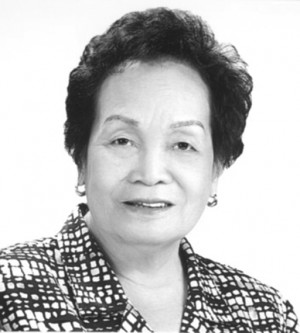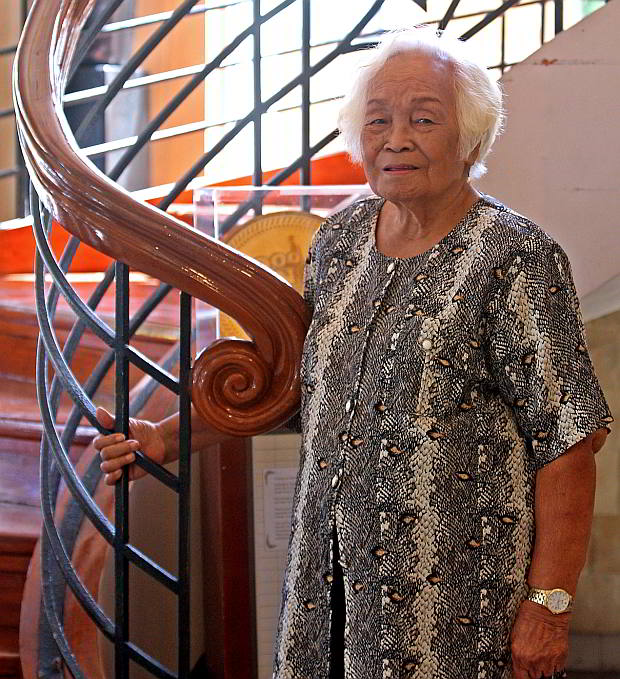(Editor’s note: Virginia “Ginny” Vamenta, the first female radio announcer on DYRC, led the way for women broadcasters in Cebu. In 1947, she was the first female radio announcer on dyRC, the first radio station to go on air after Liberation. Popular for her cool soothing voice and her near-native command of English, she says that she learned the language from the American family for whom her parents worked. Vamenta is among the honorees in Monday’s 77th Charter Day of Cebu City. She will be honored for her contributions to Cebu’s media industry. This piece was written in 2006 as a UP research report by Fe Reyes, a retired UP professor, who did her dissertation on women achievers.)
by Virginia “Ginny” Vamenta
as told to Prof. Fe N. Reyes
My involvement in radio began in 1947. That was when the Manila Broadcasting Company reopened its prewar radio station, KZRC, which soon after changed its call letters to the present DYRC.
Early on, before World War II, I was already attracted to radio announcing. I was inspired by an interesting lady I admired then, whom I only knew as Mrs. Wizlesienus, the only woman announcer at KZRC. She taught in the pre-war UP (University of the Philippines) Junior College in Lahug, after hours taught at the Chinese school downtown, and in the evening went on the air on KZRC. I hoped to be like her, busily and creatively involved the whole day.
I finally met her at dinner with Miss Merle Silloway, one of my favorite teachers in English at the Cebu Normal University), where I was then working for my Normal Graduate diploma in its two-year college curriculum. When I told her about my interest in radio and how I could get into the industry, she said: “Young lady, if you know the kind of students I meet in college, you will understand when I say, ‘Go (on with your studies, after which,) teach those in the grade school to speak correct English!” That did it for them.
After the war, however, when I was already teaching in the Training Department of the Cebu Normal School, I decided to continue night studies to earn a Bachelor of Science (Inverted Course) diploma. One of my favorite professors in English and Science at the Colegio de San Carlos (now University of San Carlos) was the late journalist Angel Anden. After classes one evening, he gave me a yellow card and said, “There’s a radio station opening in town.” It was the rate card of KZRC on Colon Street.
I went there and auditioned with quite a number of applicants for an announcer’s job. Six of us, four men and two women, made it to the finals, a hands-on probation period. Two of us finally made it, Vicente “Inting” Frias and myself.
MALE-DOMINATED INDUSTRY
I was the first and only woman announcer in what was then a largely male-dominated industry.
As the station grew, we took in more announcers, all male, and I was promoted to Chief Announcer. It is interesting to note, in the light of our modern-day concern with women empowerment and gender equality and my involvement now in the movement, that I never encountered any “macho” hostility or resentment from the all-male announcers I worked with and later supervised when I was promoted to Chief Announcer.
Later on, in 1954, I received a Smith-Mundt Leader Grant in Radio and Television for a three-month observation tour in the United States. I was the first and only Cebuano holder of the grant that year. During my visits to radio and television stations across the country, especially the major network stations in Los Angeles, New York and Chicago, I was surprised when they knew I was Chief Announcer, that they would say, “What, a woman Chief Announcer?”
Newscasts, then, were always delivered by male announcers with authoritative personalities, never by women announcers. How times have changed since then! But eventually, I was made to deliver the news, some of the items which we wrote ourselves, some we rewrote from the news dispatches on teletype.
At DYRC, Cebuano programs (like soap operas, an evening newscast, and many special events coverages) were handled in Cebuano by the late Laling Cabiluna, who was a carry-over from the prewar KZRC, and other later announcers in Cebuano. On the other hand, programs in English, of which there were more then, were handled by announcers in English, and other announcers besides pioneer Inting Frias and myself.
Magsaysay plane crash
I always announced in English where I felt most competent. Until that fateful day in 1957 when the late President Ramon Magsaysay died in a plane crash in Cebu’s Mt. Manunggal. All the announcers were out in the field and I was the only one left on board to receive their reports as well as calls from listeners. Then I received a phone call from a barangay captain saying he had seen the wreckage/remains of the crash. I immediately informed our manager and he said, “Air it!” I said, “In English?” the unspoken assumption was that I should be able to announce in Cebuano. I did not tell him I was not Cebuano. So what I did was to write out the announcement as best as I could, and aired it as a flash report. I would later on write and announce in Cebuano, commercials, program scripts, news items, and drama (soap operas) narration, and ad-lib in Cebuano on special events coverages, interviews and live talent shows.
I was born in Manila to a Bicolana mother and an Ilocano father, who worked as cook for the American Superintendent of Schools in Tarlac, Tarlac, his wife, who taught High School English, and their two children, a boy and a girl. We later moved with the family to San Fernando, Pampanga, then to school together, so that is how I learned my English. When the American family returned to the States, we settled down in Cebu where I entered high school at the then Cebu Provincial High School and went on to take the then third year two-year curriculum at the Cebu Normal School, now Cebu Normal University. I never had an opportunity to speak the vernacular in the places we were in, until World War II broke out, and we evacuated to the mountains of Carmen, north of Cebu. There I learned and had to speak in colloquial Cebuano.
After the war, when I got into radio, I finally honed my Cebuano when I was eventually assigned to read commercials, handle live talent shows, soap opera narration and special events, which I handled bilingually in Cebuano and English.
In my early years of announcing in Cebuano, I was fortunate to have as colleagues, who helped me with my Cebuano, native-born speakers of the Cebuano language: musician Ben Zubiri, composer of “Matud Nila” and many other Cebuano favorites; and writers Dading Alferez, Ruby Rubi and Tuting Villarino; and pianist-composers Mil Villareal, Maning Villareal and Mani Cabase, among others. Then, when I continued with my master’s studies at the University of San Carlos, I took a course in the Cebuano language, learning the fine points of grammar and usage.
I started out reading scripted copy, but eventually felt confident to handle most shows ad-libbing spontaneously. Much later, I was assigned to write and read the news in English and in Cebuano.
When Martial Law was declared in 1972, exactly 25 years to the day since I came to DYRC, the station was shut down and I went into Time-Life book sales. When DYRC resumed operation later on, they took in new staff and did not hire us back. I was then selling books to the Information Officer of the Associated Labor Unions that owned station DYLA: former Senator Ernesto “Boy” Herrera. He invited me to join DYLA in 1977.
The Associated Labor Unions provided me with more professional improvement, sending me to seminars in labor unionism here in Cebu and Manila. In 1979, I was recommended for an ILO (International Labor Organization) grant for Asian labor information officers, to attend a three-month seminar in Turin, Italy. Since I was the only radio broadcaster in the group of 28 grantees of which there were only three women, my culminating project for the course was a radio program in English and labor.
RESPONSIBLE BROADCASTING
DYLA, a pioneer in developmental broadcasting was the only talk station then and was funded by Friedrick-Ebert Stiftung, a German foundation. There, I learned the elements of informative, ethical and responsible broadcasting. Our programs were mainly talk shows in Cebuano and English: public service programs, newscasts, commentaries and interviews. I was a staff announcer and Program Director with DYLA until I turned 65, the usual retirement age. I was retained as consultant, continuing to handle programs, until 2001.
Meanwhile, I had been teaching Speech Improvement part-time at the University of San Carlos while I was still at DYRC. Later when I was already with DYLA, I was invited to be a lecturer (part time) in the Mass Communication program of the University of the Philippines College Cebu. Later, after I reached the UP mandatory retirement age, former UP colleague, Lani Echaves, invited me to handle a women’s program in Cebuano and English on Mom’s Radio, and FM station with an AM radio format. After one of my yearly visits to the States to visit my children, I finally gave up my Mom’s Radio stint.
Now, I handle a couple of women’s programs, one weekly and the other once a month, for legal Alternatives for Women Center, Inc. (LAW Inc.) back on DYLA. And since 1998, I write a weekly column, “Concerned Bystander”, for Cebu Daily News, an affiliate of the Manila paper, Philippine Daily Inquirer.
NEVER ‘BASTARDIZE’
Important things I learned about language in announcing: when speaking in Cebuano or interspersing Cebuano words in English, Cebuano words should be pronounced correctly, never “bastardized” or “English-ized”, as is still unfortunately done be some broadcasters, and the same for words in English (no rolled “r” as in Cebuano). In connection, one never outgrows the need for learning and further development by keeping up with current developments by reading and consulting reference materials like dictionaries, both in Cebuano and in English, thesauruses, atlases, information books and other reference materials when necessary, especially in newscasting where it is necessary to get one’s facts right!
Then, most importantly, a broadcaster must respect the listener, the guest and fellow-broadcasters. Avoid making fun at the expense of others: children, women (especially in these days of women empowerment, minorities, the racially and ethnically different, and the disabled.
These, all make for professionalism, which is very important in media, especially in the media of broadcasting.
Finally, as a woman broadcaster, I am lucky to have had a husband, who, while basically conservative and laid back, appreciated my involvement in dynamic broadcasting, allowed me space to grow professionally in the industry, while he maintained family presence with the children while I was still busy at work, and thus made possible the best years of our life together.



